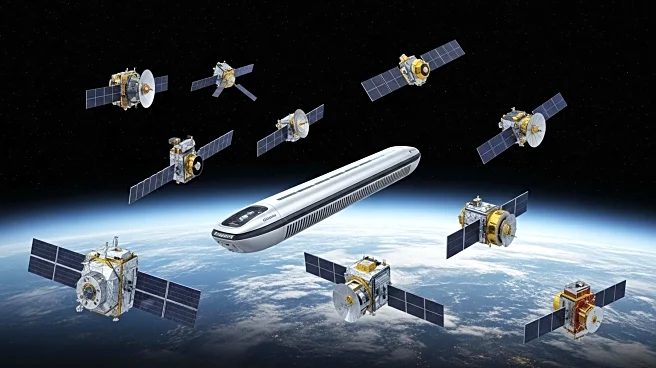What is the story about?
What's Happening?
U.S. military officials are advocating for stronger international partnerships to maintain space dominance amid growing global competition. At the Air and Space Forces Association’s Air, Space, Cyber conference, Col. Frank Brooks highlighted the complexity of space warfare and the necessity of collaboration with space-capable nations. Brig. Gen. Jacob Middleton emphasized the importance of partnerships, particularly in Africa, where China is expanding its influence. The U.S. is actively engaging with African nations like Egypt, Morocco, Nigeria, Angola, and Kenya to foster alliances. The trilateral Deep-Space Advanced Radar Capability (DARC) with Australia and the UK exemplifies such collaborations, tracking space debris and adversarial activities.
Why It's Important?
The emphasis on international partnerships is crucial for the U.S. to maintain its strategic advantage in space. As reliance on space technology grows, so do threats from adversaries, making alliances vital for security and operational effectiveness. The U.S. aims to counter China's influence in Africa by building relationships with spacefaring nations. These partnerships not only enhance technological capabilities but also strengthen geopolitical ties, ensuring that the U.S. remains a leader in space exploration and defense. The collaboration with allies helps in sharing resources, intelligence, and strategies, which are essential for addressing the dynamic challenges of space warfare.
What's Next?
The U.S. Space Forces plan to continue expanding their network of international partners, focusing on regions where strategic competition is intense. Brig. Gen. Middleton's visits to African nations signal ongoing diplomatic efforts to secure alliances. Future engagements may involve joint training exercises, technology sharing, and strategic planning to bolster collective space capabilities. The U.S. will likely increase its presence in Africa to counteract China's influence and ensure that its allies are equipped to handle space-related challenges. These efforts are expected to lead to more robust defense strategies and enhanced global security cooperation.
Beyond the Headlines
The push for international partnerships in space reflects broader geopolitical shifts, where technological superiority is intertwined with diplomatic relations. The U.S. strategy highlights the ethical dimension of space exploration, focusing on collaboration rather than unilateral dominance. This approach may set a precedent for future space governance, emphasizing shared responsibilities and mutual benefits. The cultural aspect of engaging with diverse nations also plays a role in shaping global perceptions of the U.S. as a cooperative leader in space affairs.















